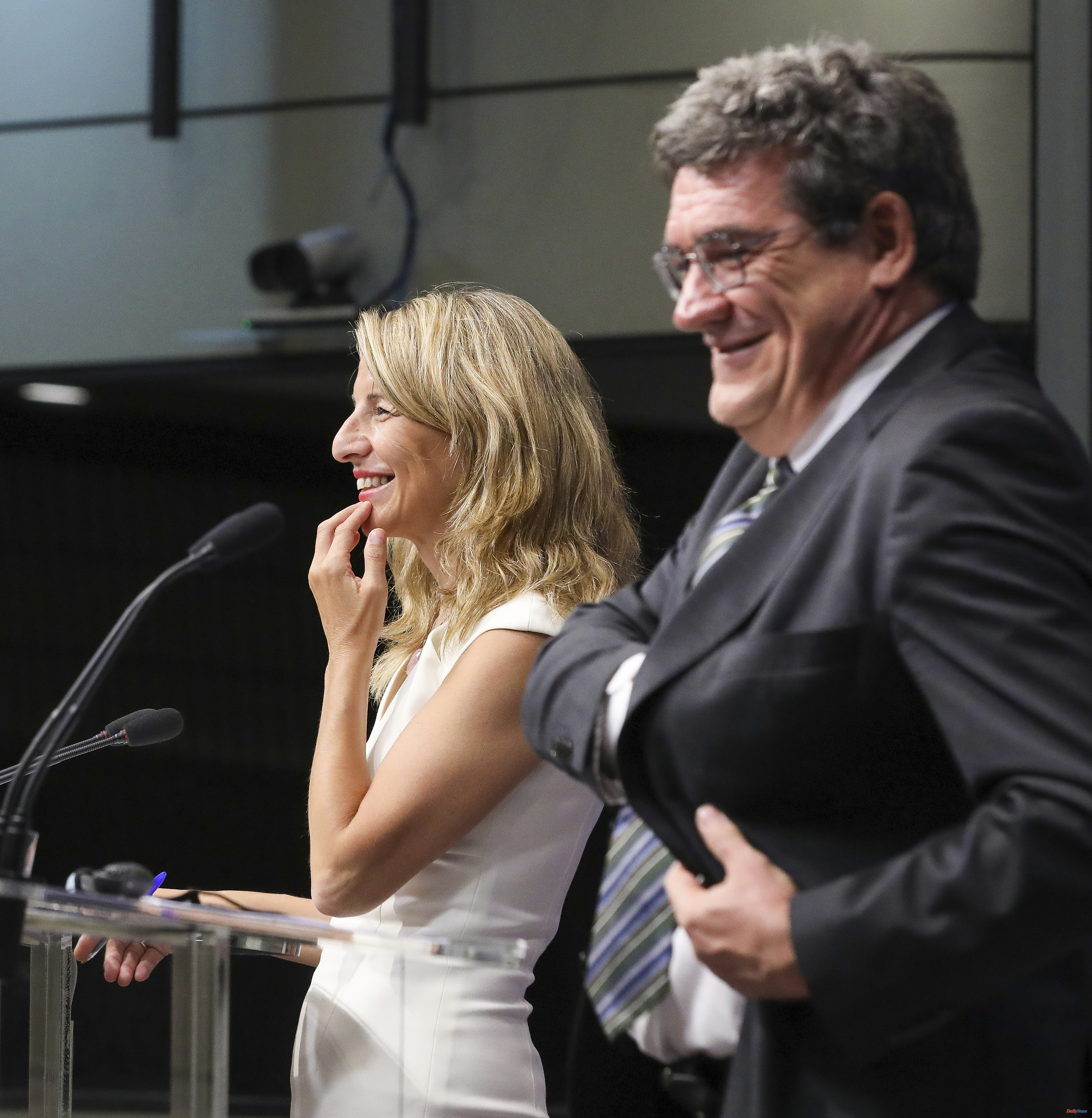The Government has closed an agreement with Unidas Podemos on the pension reform proposal that will be presented this morning to the social agents, according to Yolanda Díaz herself, Second Vice President and Minister of Labor, and who also has the approval of the European Commission, as reported on Thursday by Minister José Luis Escrivá.
It was obvious that when the Minister of Social Security said yesterday that the agreement was "practically closed" and even that he hoped that the pact with the social agents would be made today because it already had the green light from the Commission, the text also had all the necessary qualities to be accepted by Podemos and, therefore, by the rest of the minority partners of the investiture.
The main problem that had prevented this parliamentary support until now was the intention of the Executive to extend the computation period from the last 25 years that are currently used to the best 28 of the last 30. That option has been discarded and will be replaced by a possibility open to retirees, who can choose between having their pension calculated according to the salaries received in the last 25 years or opting for the salary of the best 27 years of the last 29 to be taken as a reference.
The proposal, which has already convinced Podemos, is expected to please the unions, which also opposed an imposed extension of the calculation period.
For Brussels, to whom Escrivá had promised "the adaptation to the new professional career models of the computation period for calculating the retirement pension", in Component 30 of the Recovery Plan, it is assumed that the measure has also fitted.
The minister has been negotiating three ways and, in the last two months, especially in Brussels and with the parties, to make sure that the advances he made with the community institutions would be accepted in the Spanish parliamentary circle. Knowing from the beginning the position of the unions, he could also know if the measures would be accepted by the latter.
In practice, moreover, having the approval of a part of the social dialogue is not so important for the European Commission, to whom what matters is that the reform becomes the norm and enters into force. The more consensus you have, the better, but it is not a sine qua non requirement to comply with what was agreed in the Recovery Plan.
Although CEOE and Cepyme will attend the meeting this Friday at 12:30 p.m., an agreement with them is ruled out, since from the beginning they have opposed a reform that acts mainly on the revenue side, charging companies with new charges. to offset the increase in spending derived from linking pensions to the CPI.
"We have reached an agreement to protect pensions and reinforce the redistributive nature of the system. We will do so by increasing the income that companies will contribute for the highest salaries and protecting the lowest pensions more," admitted Yolanda Díaz. Along the same lines, Ione Belarra, Minister of Social Affairs for the Podemos quota, has pronounced: "We extend rights to pensioners, guaranteeing the sustainability of the system thanks to the increase in income."
It is assumed that the Executive will try to have only the approval of the unions. Once it has it, it will approve the reform by royal decree-law in one of the next Councils of Ministers and it will be validated in Congress before Easter. Escrivá also plans to go to the Toledo Pact Commission to inform his deputies, something that they have been demanding for a long time.
The Executive is in a hurry to carry out the reform since it accumulates a delay of two months with respect to the commitment it had with Brussels. In the Recovery Plan, he had planned to approve the reform before December 31 and the next disbursement of European funds - the fourth that Spain will receive - is linked to this reform being in force.
The problem is that reaching consensus has been difficult, especially since the government needs it on three fronts. On the one hand, with the European institutions, which seem to have already given the go-ahead to the set of measures proposed by Escrivá -those already approved, which increased spending, and the proposals now, to compensate for this imbalance-; the parliamentary arch, where they have had to ensure that what has been committed to Brussels has sufficient support to be approved, and finally the social agents, since what is desirable is that they put their stamp on the reform.
At that table, there are two very distant positions. From the beginning, employers have opposed the Government's proposals, which go through guaranteeing the sustainability of the pension system, acting fundamentally through income, that is, increasing the contributions of the companies and without making any containment through the spent. For this reason, CEOE and Cepyme have remained practically on the sidelines of the negotiation.
Although the employers have not yet expressed their position, they are already anticipating their no to the reform. Lorenzo Amor, president of ATA and vice president of CEOE, lamented that "Escrivá's and the Government's tax collection voracity has no limits. Everything indicates that the increase in the cost of pensions will cover it with a strong increase in contributions, seriously risking employment and the viability of companies and the self-employed, which it will continue to fleece".
Escrivá has focused on dialogue with those with whom there was a possibility of an agreement, the UGT and CCOO, although they have insisted from the beginning that, before negotiating, the Ministry must have political support and backing from Brussels. Even so, the unions showed their cards from the beginning: they opposed the extension of the calculation period to calculate the pension (something that Escrivá had promised the Commission on its own, without expressly appearing in the recommendations of the Pact of Toledo and which, in theory, had no impact on the costs of the system) and also made their list of requests. The latter, which included a more flexible minimum contribution period to access the pension, have been interpreted as a possible bargaining chip for the unions to end up accepting a change in the calculation period, as long as this does not mean lower pensions.
This Friday at 12.30 they will meet at the headquarters of the Ministry of Social Security. At the end of the meeting, they could already stage the bipartite agreement and announce the main lines of the reform or wait until next week to do so, in case the UGT and CCOO want to analyze any extreme in detail or if it is convenient for agenda reasons. informative.
According to the criteria of The Trust Project












